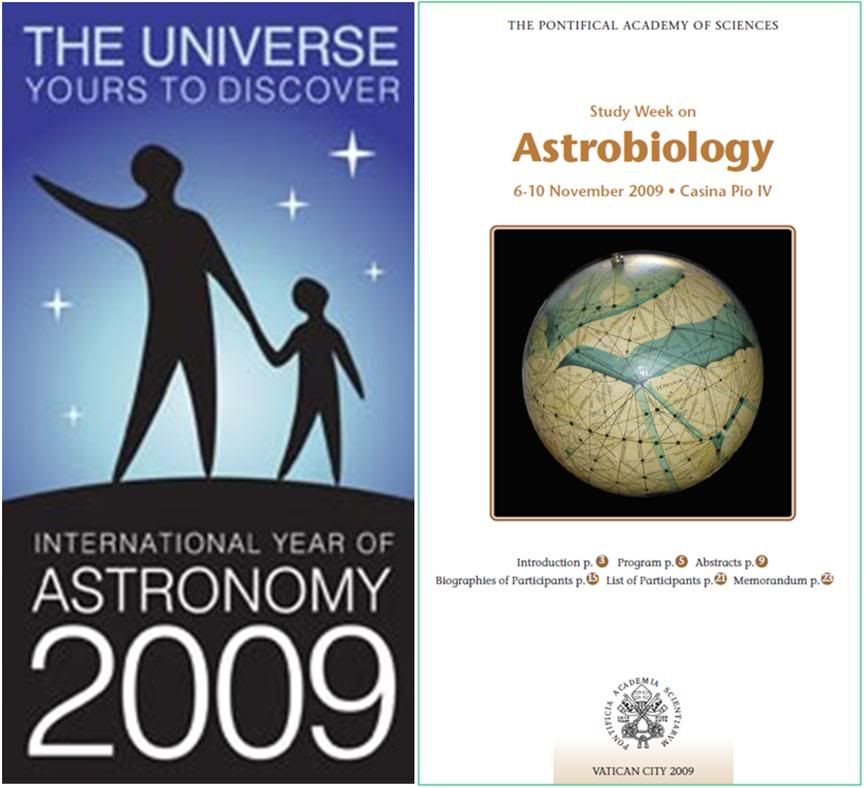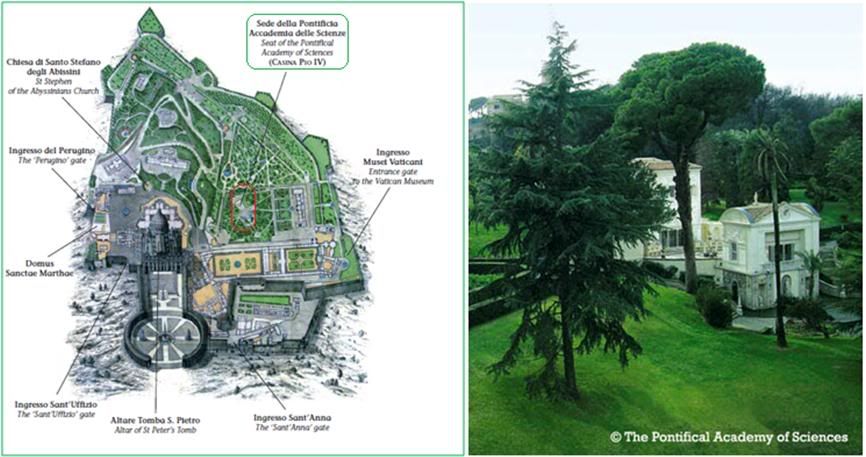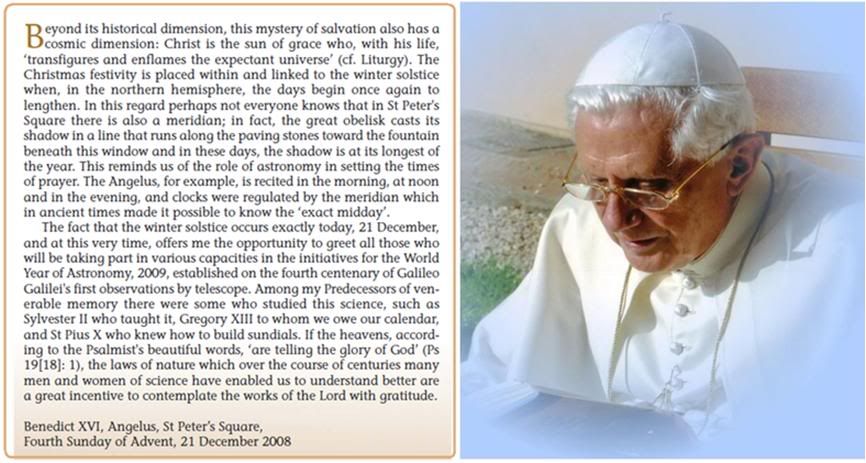 Most laymen, even well informed ones, probably do not know there is a Pontifical Academy of Sciences, which is one of the world's most prestigious scientific academies - of which, not incidentally, Cardinal Ratzinger was named an honorary member in 2000 [though I see his name is no longer listed on the roster), It was in the news today because it just held the first-ever international conference on Astrobiology.
Vatican academy pioneers inquiry
Most laymen, even well informed ones, probably do not know there is a Pontifical Academy of Sciences, which is one of the world's most prestigious scientific academies - of which, not incidentally, Cardinal Ratzinger was named an honorary member in 2000 [though I see his name is no longer listed on the roster), It was in the news today because it just held the first-ever international conference on Astrobiology.
Vatican academy pioneers inquiry
into the possibilities
of extra-terrestrial life forms


VATICAN CITY, 10 NOV 2009 (VIS) - The conclusions of a study week on astrobiology, organised by the Pontifical Academy of Sciences and the Vatican Observatory, were presented this morning in the Holy See Press Office.
Participating in the press conference were Fr. Jose Funes S.J., director of the Vatican Observatory; Jonathan Lunine, professor at the department of physics in Rome's Tor Vergata University; Chris Impey, professor at the department of astronomy in the University of Arizona and the Steward Observatory, Tucson, U.S.A., and Athena Coustenis, professor at the "Observatoire de Paris-Meudon", LESIA/CNRS, France.
"Why is the Vatican involved in astrobiology?" asked Fr. Funes in his remarks, going on to explain that "although astrobiology is an emerging field and still a developing subject, the questions of life's origins and of whether life exists elsewhere in the universe are very interesting and deserve serious consideration. These questions offer many philosophical and theological implications".
"Astrobiology is the study of life's relationship to the rest of the cosmos: its major themes include the origin of life and its precursor materials, the evolution of life on earth, and its future prospects on and off the earth. ... The study week provided a special opportunity for scientists from different basic disciplines to spend an intensive week understanding how the work in their particular specialty might have an impact on, or be impacted by, that in other areas. Nowhere is this more evident than in the work being done on how life formed on the earth and evolved with the changing environment", explained Professor Lunine.
For his part, Professor Impey observed that "if biology is not unique to the earth, or if life elsewhere differs bio-chemically from our version, or if we ever make contact with an intelligent species in the vastness of space, the implications for our self-image will be profound. It is appropriate that a meeting on this frontier topic be hosted by the Pontifical Academy of Sciences. The motivations and methodologies might differ, but both science and religion posit life as a special outcome of a vast and mostly inhospitable universe. There is a rich middle ground for dialogue between the practitioners of astrobiology and those who seek to understand the meaning of our existence in a biological universe".
The press conference on the study work - held in the Vatican's Casina Pio IV from 6 to 10 November - concluded with the remarks of Athena Coustenis on the subject of the exploration of outer planets and their systems.
The Casina Pio IV in the Vatican Gardens.
 The PDF booklet on the Study week, with abstracts of the papers presented and biodata on the participants can be found on
www.vatican.va/roman_curia/pontifical_academies/acdscien/2009/booklet_astrobiolog...
The PDF booklet on the Study week, with abstracts of the papers presented and biodata on the participants can be found on
www.vatican.va/roman_curia/pontifical_academies/acdscien/2009/booklet_astrobiolog...
 When E.T. phones the Pope
When E.T. phones the Pope
By Marc Kaufman

Sunday, November 8, 2009
ROME -- A little more than a half-mile from the Vatican, in a square called Campo de' Fiori, stands a large statue of a brooding monk. Few of the shoppers and tourists wandering through the fruit-and-vegetable market below may know his story; he is Giordano Bruno, a Renaissance philosopher, writer and free-thinker who was burned at the stake by the Inquisition in 1600. Among his many heresies was his belief in a "plurality of worlds" -- in extraterrestrial life, in aliens.
Though it's a bit late for Bruno, he might take satisfaction in knowing that this week the Vatican's Pontifical Academy of Sciences is holding its first major conference on astrobiology, the new science that seeks to find life elsewhere in the cosmos and to understand how it began on Earth.
Convened on private Vatican grounds in the elegant Casina Pio IV, formerly the pope's villa, the unlikely gathering of prominent scientists and religious leaders shows that some of the most tradition-bound faiths are seriously contemplating the possibility that life exists in myriad forms beyond this planet.
Astrobiology has arrived, and religious and social institutions -- even the Vatican -- are taking note.
Father Jose Funes, a Jesuit astronomer, director of the centuries-old Vatican Observatory and a driving force behind the conference, suggested in an interview last year that the possibility of "brother extraterrestrials" poses no problem for Catholic theology.
"As a multiplicity of creatures exists on Earth, so there could be other beings, also intelligent, created by God," Funes explained. "This does not conflict with our faith because we cannot put limits on the creative freedom of God."
Yet, as Bruno might attest, the notion of life beyond Earth does not easily coexist with the "truths" that many people hold dear. Just as the Copernican revolution forced us to understand that Earth is not the center of the universe, the logic of astrobiologists points in a similarly unsettling direction: to the likelihood that we are not alone, and perhaps that we are not even the most advanced creatures in the universe. This may not "conflict with our faith," but it may conflict with the stories we tell about who and what we are.
The Vatican's five-day conference is chaired by the religious leader of the highly regarded Academy, Bishop Marcelo Sanchez Sorondo. Scientists (many of them nonbelievers) are offering presentations on subjects as varied as how life might have begun on Earth; what newly found "extremophile" microbes living in harsh places on our planet might tell us about possible life on others; and how life forms might be detected in our solar system, or how their bio-signatures might be found on and around the many distant exoplanets.
Having overcome the giggle factor of most things extraterrestrial, astrobiologists are telling a scientific story to an audience that may someday use it to defend -- or enhance -- its faith.
The Catholic Church isn't the only institution preparing itself for what could be a world-changing event. For instance, NASA's National Astrobiology Institute, established in 1998, sponsored a meeting of scientists, ethicists, religious leaders and philosophers in February to brainstorm about the societal implications of astrobiology, and it is preparing a semiofficial "road map" of sensitive issues we'd need to address should the presence of life elsewhere be established.
Initial extraterrestrial discoveries -- which many scientists believe are on the horizon, if not yet in reach -- are likely to be of microbial life just below the parched surface of Mars, in the waters of Jupiter's moon Europa under its thick crust of ice or in the liquid plumes of Saturn's moon Enceladus.
Though it will be easy to dismiss extraterrestrial microbes as unthreatening to anyone's worldview, cosmologists and astrobiologists generally contend that the existence of two separate geneses in one solar system would enormously increase the probability that life is commonplace in the universe. And as we know, under the right conditions microbes can evolve over eons to become dinosaurs, hummingbirds and us.
The possibility of extraterrestrial life is not much of an issue for Eastern religions, which tend to be less Earth-centric. Islam also has little problem with extraterrestrials because the Koran speaks explicitly of life beyond Earth, as do some newer Christian groups such as Mormons.
It is in mainstream Western religious traditions, in which humans and God are central, where astrobiology poses the biggest challenge.
"I think the discovery of a second genesis would be of enormous spiritual significance," says Paul Davies, a theoretical physicist and cosmologist from Arizona State University who is speaking at the Vatican conference. He believes the potential challenge to Christianity in particular "is being downplayed" by religious leaders.
"The real threat would come from the discovery of extraterrestrial intelligence, because if there are beings elsewhere in the universe, then Christians, they're in this horrible bind. They believe that God became incarnate in the form of Jesus Christ in order to save humankind, not dolphins or chimpanzees or little green men on other planets."
Davies explained the tensions within the Catholic Church: "If you look back at the history of Christian debate on this, it divides into two camps. There are those that believe that it is human destiny to bring salvation to the aliens, and those who believe in multiple incarnations," he said, referencing the belief that Christ could have appeared on other planets at other times. "The multiple incarnations is a heresy in Catholicism." (As Giordano Bruno learned.)
Many Protestant scholars agree with Funes, saying that the discovery of extraterrestrial life would not pose a major challenge to their faith or theology, especially if it was not intelligent or morally aware. But on the evangelical side, there is a deep concern, one reminiscent of the battles over evolution.
"My theological perspective is that E.T. life would actually make a mockery of the very reason Christ came to die for our sins, for our redemption," Gary Bates, head of Atlanta-based Creation Ministries International, told me recently in a critique of the Vatican conference.
Bates believes that "the entire focus of creation is mankind on this Earth" and that intelligent, morally aware extraterrestrial life would undermine that view and belief in the incarnation, resurrection and redemption drama so central to the faith. "It is a huge problem that many Christians have not really thought about," he said.
The big question involves intelligent life. Astronomers say there are something like 10,000,000,000,000,000,000,000 stars in the known universe, and more planets are discovered orbiting some of them all the time. (On one day last month, the European Space Agency announced the discovery of 32 new extra-solar planets.)
It is increasingly difficult to assume that our sun and planet are the only ones capable of supporting complex and evolved life -- the kind of life that Christians might assume would be in need of salvation. Questions inevitably follow: Are Christianity and, to some extent, other religions only stories about life on Earth? And if they are not "universal" in a cosmic sense, does that diminish their significance?
Thus the conference on astrobiology at the Vatican -- an institution that got Copernicus, Galileo and other men of science wrong and doesn't want to do that again. In the words of Pierre Lena, a French astrophysicist and member of the Pontifical Academy who pressed for the astrobiology conference: "Astrobiology is a mature science that says very interesting things that could change the vision humanity has of itself. The church cannot be indifferent to that."
Funes, an earnest priest-scientist with a wry sense of humor, seemed a bit nonplussed last week about the worldwide attention that his "brother extraterrestrials" comments from last year and the astrobiology conference have drawn.
Speaking to me from the new Vatican Observatory headquarters outside Rome -- the Church also operates a telescope in Arizona -- he didn't retract his statements or express regret about them, and said he has not been chastised by higher-ups at the Vatican.
But he did emphasize that he was not speaking officially for the Church, even though his 2008 interview ran on the front page of the official Vatican newspaper,
L'Osservatore Romano. The Church, he said, has no official position on extraterrestrial life or on theological issues it might raise.
Just as some people write science fiction, Funes said with a mischievous smile, he is attracted to "theological fiction" -- what might become important religiously if life beyond Earth is discovered someday.
"There's no need for the Church to speak on this point now," he said. "But yes, that could certainly change."
Marc Kaufman, a science and space reporter for The Washington Post, is on leave writing a book about astrobiology.
[Modificato da TERESA BENEDETTA 10/02/2010 00:23]